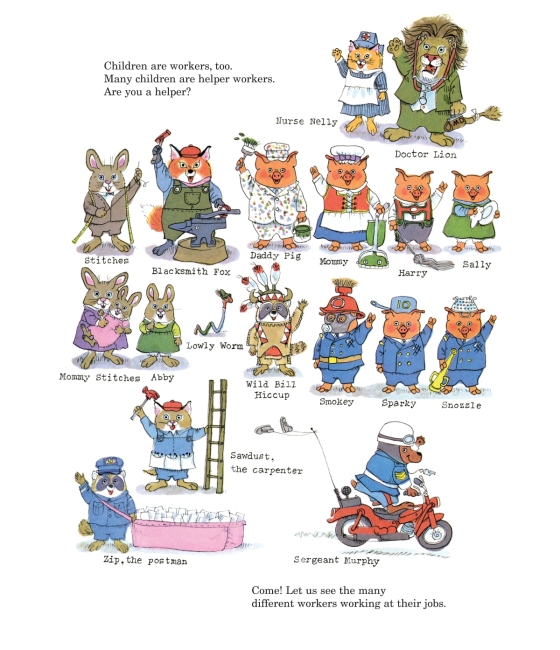What Do People Do All Day?

As you know, I am amused by Richard Scarry.
I like his style — it’s beautiful — but I’m skeptical of his idealistic obsession with manic and uneneding labour. It’s all in good fun but there’s also a sinister calvinism just beneath the surface. “Children are workers too” reads a page of his What Do People Do All Day?. Look into the eyes of that fireman cat and you’ll see the abyss.
Does “busyiness” necesarily need to be “work.” i.e. at one with the jobs the system? Perhaps that’s a question for another day.
Reader Andrew shares this short article with us. It’s a month old now because I’m a bum.
[As a child] I was terrified of being left alone, terrified of the dark, scared of UFOs and, perhaps most trickily, stricken by the existential panic of not knowing what to do with myself. It seemed to me entirely possible that at any time someone was going to take a look at me, realise I had no idea how I was going to spend my days and permanently send me to the naughty corner of life (ie, I’d end up an accountant).
For that reason, the title of [Richard] Scarry’s book was both a horrifyingly loaded question (“What do YOU do all day?”) and a soothing promise that if I read the tome, I would understand exactly how I was meant to spend my time.
The article is about the joy of “little jobs” — errands — as distinct from a career.
I’m not sure how practical it is to seek out little jobs as your main activity in life without also fretting about money all the time or becoming tied up in some sort of precariat scam administered by a Deliveroo-type company, but maybe I haven’t thought about it enough. There are probably ways. I’ve vouched for temping before. My friend Henry gets by with casual cash-in-hand gardening work.
The beauty of a little job is that it is disconnected from the culture of “career as self-worth and identity” that capitalism thrusts upon us. We are encouraged to think that our careers explain us totally – how often we get asked, “What do you do?” as though that will make us comprehensible to the world. But little jobs are not seen as tied to our souls in this way. […] A little job is healing; it allows us to divide the unbearable wash of our days into neat little segments, transforming our lives into oranges that we may peel and eat slice by slice.
*




About Robert Wringham
Robert Wringham is the editor of New Escapologist. He also writes books and articles. Read more at wringham.co.uk